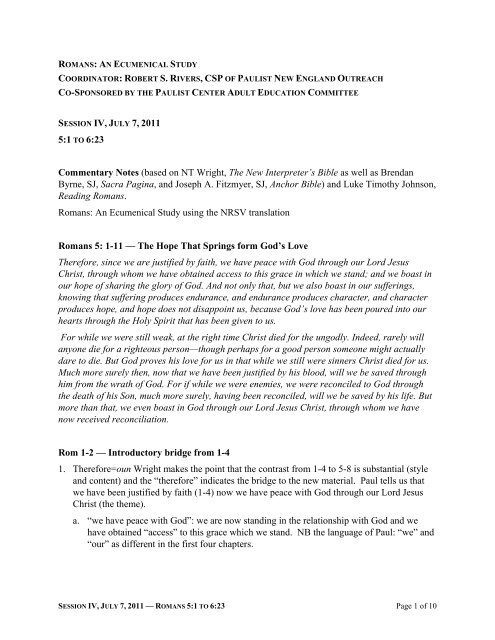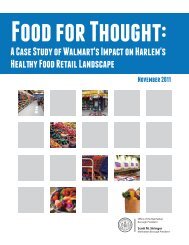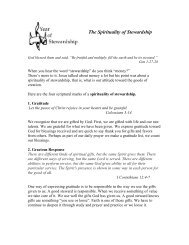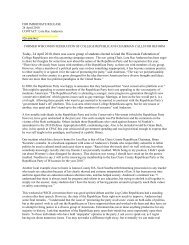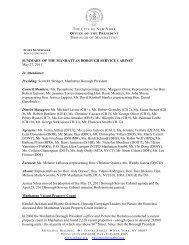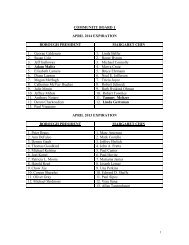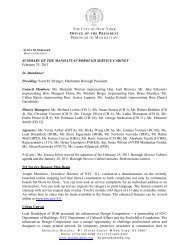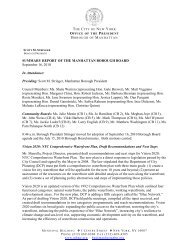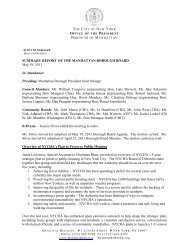5:1 TO 6:23 Commentary Notes (based on NT Wright, The New ...
5:1 TO 6:23 Commentary Notes (based on NT Wright, The New ...
5:1 TO 6:23 Commentary Notes (based on NT Wright, The New ...
You also want an ePaper? Increase the reach of your titles
YUMPU automatically turns print PDFs into web optimized ePapers that Google loves.
ROMANS: AN ECUMENICAL STUDYCOORDINA<str<strong>on</strong>g>TO</str<strong>on</strong>g>R: ROBERT S. RIVERS, CSP OF PAULIST NEW ENGLAND OUTREACHCO-SPONSORED BY THE PAULIST CE<strong>NT</strong>ER ADULT EDUCATION COMMITTEESESSION IV, JULY 7, 20115:1 <str<strong>on</strong>g>TO</str<strong>on</strong>g> 6:<str<strong>on</strong>g>23</str<strong>on</strong>g><str<strong>on</strong>g>Commentary</str<strong>on</strong>g> <str<strong>on</strong>g>Notes</str<strong>on</strong>g> (<str<strong>on</strong>g>based</str<strong>on</strong>g> <strong>on</strong> <strong>NT</strong> <strong>Wright</strong>, <strong>The</strong> <strong>New</strong> Interpreter’s Bible as well as BrendanByrne, SJ, Sacra Pagina, and Joseph A. Fitzmyer, SJ, Anchor Bible) and Luke Timothy Johns<strong>on</strong>,Reading Romans.Romans: An Ecumenical Study using the NRSV translati<strong>on</strong>Romans 5: 1-11 — <strong>The</strong> Hope That Springs form God’s Love<strong>The</strong>refore, since we are justified by faith, we have peace with God through our Lord JesusChrist, through whom we have obtained access to this grace in which we stand; and we boast inour hope of sharing the glory of God. And not <strong>on</strong>ly that, but we also boast in our sufferings,knowing that suffering produces endurance, and endurance produces character, and characterproduces hope, and hope does not disappoint us, because God’s love has been poured into ourhearts through the Holy Spirit that has been given to us.For while we were still weak, at the right time Christ died for the ungodly. Indeed, rarely willany<strong>on</strong>e die for a righteous pers<strong>on</strong>—though perhaps for a good pers<strong>on</strong> some<strong>on</strong>e might actuallydare to die. But God proves his love for us in that while we still were sinners Christ died for us.Much more surely then, now that we have been justified by his blood, will we be saved throughhim from the wrath of God. For if while we were enemies, we were rec<strong>on</strong>ciled to God throughthe death of his S<strong>on</strong>, much more surely, having been rec<strong>on</strong>ciled, will we be saved by his life. Butmore than that, we even boast in God through our Lord Jesus Christ, through whom we havenow received rec<strong>on</strong>ciliati<strong>on</strong>.Rom 1-2 — Introductory bridge from 1-41. <strong>The</strong>refore=oun <strong>Wright</strong> makes the point that the c<strong>on</strong>trast from 1-4 to 5-8 is substantial (styleand c<strong>on</strong>tent) and the “therefore” indicates the bridge to the new material. Paul tells us thatwe have been justified by faith (1-4) now we have peace with God through our Lord JesusChrist (the theme).a. “we have peace with God”: we are now standing in the relati<strong>on</strong>ship with God and wehave obtained “access” to this grace which we stand. NB the language of Paul: “we” and“our” as different in the first four chapters.SESSION IV, JULY 7, 2011 — ROMANS 5:1 <str<strong>on</strong>g>TO</str<strong>on</strong>g> 6:<str<strong>on</strong>g>23</str<strong>on</strong>g> Page 1 of 10
i. peace=shalom c<strong>on</strong>trast to hostility; “we have” peace is translati<strong>on</strong> (present or subjunctive).<strong>Wright</strong> makes a big point about the c<strong>on</strong>trast of peace of the kingdom compared the worldof the Roman emperor: politically subversi<strong>on</strong> nature of Christ‟s loyalty.ii.access: a liturgical metaphor in the At<strong>on</strong>ement or as sense of presence of God as comingbefore the presence of some<strong>on</strong>e important (royal chamber)b. “boast in hope of the glory of God”: boasting is such an interesting word in the Romanand Jewish culture. In this case, we have a valid boasting because we are trusting not inmyself or our achievements but in God‟s power and operati<strong>on</strong> of hope.i. hope is now a major theme and the hope of the glory of God already in the first paragraphof chapter 5ii. LTJ (p. 85) and Byrne (p. 166) make the point that “hope” is not the future but the present<str<strong>on</strong>g>based</str<strong>on</strong>g> up<strong>on</strong> God‟s presence and power. Hope is that “which enables us to move into thefuture because of the reality of God‟s presence in the „now time.‟”2. Boasting in present suffering (3-5). Paul builds <strong>on</strong> these opening statement using therhetorical device known as sorites or climax which is a chain-phrase of words such asafflicti<strong>on</strong>s, endurance, character, hope, and ultimately climax of God‟s love poured out intoour hearts.a. sequence from suffering to hope is not obvious for most people, Bitterness and despair,may, but not hope. NB the chain of words that bring a traditi<strong>on</strong>al movement fromsuffering to hope (Byrne, p. 166. 170).b. “<strong>The</strong> love of God poured out through the Spirit.”i. “love of God”is either subjective (God‟s love) or objective (love of God.. Earlycommentators understood as objective, but today most believe it is subjective(Fitzmyer, p. 398; Byrne, LTJ, and <strong>Wright</strong>.ii.iii.“love of God”: <strong>Wright</strong> focuses <strong>on</strong> a great theme of God‟s love as a covenant them asrighteousness was a creator/covenant theme. This is perhaps <strong>on</strong>e of the mostimportant interpretati<strong>on</strong>s of the Covenant fidelity using a <strong>New</strong> Exodus and Shemaview of Romans (Romans and the <strong>The</strong>ology of Paul).Pouring: Ezekiel 36-7 and the Spirit as the eschatological gift (vs. 5); comparedQumran (Fitzmyer, p. 398)...3. (6-10) the hope that springs from God‟s love dealing through Christ‟ deatha. “While we were still weak….at the right time…Christ died for the ungodly=asebes”i. paradox of sinners (weak) and the save at Christ‟s death and the right time(kairos=right time)ii.died for the ungodly has a theme of servant s<strong>on</strong>g, justified for many. <strong>Wright</strong> speaksabout the Servant S<strong>on</strong>g has part of the Covenant fidelity themeSESSION IV, JULY 7, 2011 — ROMANS 5:1 <str<strong>on</strong>g>TO</str<strong>on</strong>g> 6:<str<strong>on</strong>g>23</str<strong>on</strong>g> Page 2 of 10
. Another rhetorical device: amplificati<strong>on</strong> of c<strong>on</strong>trasts between good people and sinners; toemphasize how <strong>on</strong>e things is “greater than another to” or “how much the more (pollomall<strong>on</strong> (Greek) or a minore ad maius (Latin) or qal we homer (Hebrew) emphasizerec<strong>on</strong>ciliati<strong>on</strong> in Jesus‟ death. Argument is to show how God‟s has dealt with sinnersversus good people and rec<strong>on</strong>ciled people were enemies (LTJ and Byrne).c. rec<strong>on</strong>ciliati<strong>on</strong> occurred through the death of Jesus and thus, we will be saved by his life.NB Paul does not speak here about the resurrecti<strong>on</strong> as the active role of salvati<strong>on</strong>.Rec<strong>on</strong>ciliati<strong>on</strong> is image of the diplomacy world (Byrne) as opposed to the law courtimage of the first four chapters.d. Rec<strong>on</strong>ciled to God through the death of his S<strong>on</strong>i. Romans brings tremendous richness of the soteriological and Christological material.In some ways, this is <strong>on</strong>e of the most important gift from Paul in Romans. This is thefirst time Paul has alluded to Jesus as “s<strong>on</strong> of God” since the greetings (1:4 LTJ).ii. Meaning of his “S<strong>on</strong>”? Radical character f God‟s love for humans, spare even the<strong>on</strong>ly S<strong>on</strong>. Paul‟s view of the adopti<strong>on</strong>, s<strong>on</strong> of God, distinctive status brings Jesusboth for humans and for God (LTJ, p. 91).4. vs. 11: Boasting in Goda. “boast” inclusi<strong>on</strong> in vs. 2. 11b. boast is the rec<strong>on</strong>ciati<strong>on</strong> that we have received and thus have hope. NB Paul makes thepoint that the law is not where we will be saved (3: 21-31; 5:1).Romans 5: 12-21 — <strong>The</strong> Legacy of Christ (Righteousness and Life) Outweighs the Legacyof Adam (Sin and Death)<strong>The</strong>refore, just as sin came into the world through <strong>on</strong>e man, and death came through sin, and sodeath spread to all because all have sinned— sin was indeed in the world before the law, but sinis not reck<strong>on</strong>ed when there is no law. Yet death exercised domini<strong>on</strong> from Adam to Moses, evenover those whose sins were not like the transgressi<strong>on</strong> of Adam, who is a type of the <strong>on</strong>e who wasto come.But the free gift is not like the trespass. For if the many died through the <strong>on</strong>e man’s trespass,much more surely have the grace of God and the free gift in the grace of the <strong>on</strong>e man, JesusChrist, abounded for the many. And the free gift is not like the effect of the <strong>on</strong>e man’s sin. Forthe judgement following <strong>on</strong>e trespass brought c<strong>on</strong>demnati<strong>on</strong>, but the free gift following manytrespasses brings justificati<strong>on</strong>. If, because of the <strong>on</strong>e man’s trespass, death exercised domini<strong>on</strong>through that <strong>on</strong>e, much more surely will those who receive the abundance of grace and the freegift of righteousness exercise domini<strong>on</strong> in life through the <strong>on</strong>e man, Jesus Christ.<strong>The</strong>refore just as <strong>on</strong>e man’s trespass led to c<strong>on</strong>demnati<strong>on</strong> for all, so <strong>on</strong>e man’s act ofrighteousness leads to justificati<strong>on</strong> and life for all. For just as by the <strong>on</strong>e man’s disobedience themany were made sinners, so by the <strong>on</strong>e man’s obedience the many will be made righteous. Butlaw came in, with the result that the trespass multiplied; but where sin increased, graceSESSION IV, JULY 7, 2011 — ROMANS 5:1 <str<strong>on</strong>g>TO</str<strong>on</strong>g> 6:<str<strong>on</strong>g>23</str<strong>on</strong>g> Page 3 of 10
abounded all the more, so that, just as sin exercised domini<strong>on</strong> in death, so grace might alsoexercise domini<strong>on</strong> through justificati<strong>on</strong> leading to eternal life through Jesus Christ our Lord.Rom 5: 12abc1. dia touto=therefore is not a simple, limited c<strong>on</strong>clusi<strong>on</strong> of 1-11 but a large bite of Paul‟s viewof justificati<strong>on</strong> and life that brings Christian s through God‟s grace in Christ Jesus our Lord.LTJ notes the chiastic abba‟ sin, world, <strong>on</strong>e pers<strong>on</strong> and death..a. Paul‟s think is large dealing primordial view of Adam and Christ (more than Abraham)with rhetorical devices to push the limits of comparis<strong>on</strong> (synkrisis) to bring extrordinarymeaning of the beginnings of sin, death and the more important the grace, obedience andsalvati<strong>on</strong>. Paul uses third pers<strong>on</strong> rather than „we‟ and „our‟ to proclaim the incredibleachievement of Christ salvati<strong>on</strong>.b. Paul proclaims the historical moment of sin and death in the <strong>on</strong>e pers<strong>on</strong>, Adam but deathand sin, a tyrant, alienated power reigning and are pers<strong>on</strong>ified (see Wis 1:13-14; 2:<str<strong>on</strong>g>23</str<strong>on</strong>g>-24).i. NB Paul presumes that Adam and Pers<strong>on</strong> are individuals, not mythical beings(Fitzmyer, p. 410-12). <strong>The</strong> Adam traditi<strong>on</strong> brings Paul from not necessarily theRabbis but certainly from Scriptures and post biblical Jewish literature of Sec<strong>on</strong>dTemple period (Fitzmyer, p. 412; Byrne p. 174; <strong>Wright</strong>, p. 524). .ii. <strong>The</strong> statement is ultimately finished clearly in vs. 19. Syntax is difficult, but themeaning clear through 5:12-21. What is important is the superior balance aboutvictory of new creati<strong>on</strong>, and reign of grace and obedience brings victory over sin andAdam.2. 5: 12d “Original sin”a. Roman Catholic Church <strong>on</strong> Original Sin. Fitzmyer has detailed commentary <strong>on</strong> therelati<strong>on</strong>ship between Genesis 1-3, Romans 5: 12, and Trent , p. 408-10). <strong>The</strong> key is theprimordial view of sin and evil present from “the beginnings” and most importantly thevictory of the sec<strong>on</strong>d Adam bring salvati<strong>on</strong> to all.b. translati<strong>on</strong> and interpretati<strong>on</strong> of 5:12d: eph ho=because, result that, etc.i. Translati<strong>on</strong> of eph ho=because for most as in the NRSV, NJB “because”, „inasmuch asall sinned,” NEB, NAB. Byrne, LTJ, <strong>Wright</strong>= „because‟ and Fitzmyer: “with theresult that.” Byrne says that Fitzmyer “c<strong>on</strong>secutive” interpretati<strong>on</strong> makes little sensein the c<strong>on</strong>text (p. 183).ii. Fitzmyer and Byrne have view that Adam is the primary culprit (15a, 16a, 17a, 18a,19a ) and a sec<strong>on</strong>dary causality to the sins of all human beings (Byrne calls „doublecausality). This is a very important understanding of sin.Rom 5: 13-14 — A clarificati<strong>on</strong> c<strong>on</strong>cerning the law (aside)Paul wants speaks about the Adam-Christ comparis<strong>on</strong> but we must speak about the law whichwas a epoch of human history between Moses and Israel. In any case sin reigned from Adamthrough the Moses period. It does not making any difference present or absence of the law. PaulSESSION IV, JULY 7, 2011 — ROMANS 5:1 <str<strong>on</strong>g>TO</str<strong>on</strong>g> 6:<str<strong>on</strong>g>23</str<strong>on</strong>g> Page 4 of 10
wants to strengthen the prototype of Adam and Christ to focus <strong>on</strong> sin and grace without makingthe law complicated issue.Paul 5: 15-17 — Adam and Christ---alike and unalike1. Rhetorical device is comparis<strong>on</strong> and unbalanced comparis<strong>on</strong> or c<strong>on</strong>trast (syndrisis) of Adamand Christ.a. eight comparis<strong>on</strong> in this material basically bring grace versus trespass or sin to focus <strong>on</strong>the superiority of Christ. Paul compares transgress, death to c<strong>on</strong>trast the how much morecomes to grace and justificati<strong>on</strong>. Sin reigned but more will bring reign of life. Keywords: overflow (eperisseusen) and superiority (pollo mall<strong>on</strong>) and the c<strong>on</strong>sequence ofeffective the many (poll<strong>on</strong>) to emphasize <strong>on</strong> Christ‟ acti<strong>on</strong>.b. Greek brings a use of the language in s string of nouns with endings in a series ofwords─ma- (homoioma, paraptoma, charisma, dorema, krima, katakrima, dikaioma) wecannot appreciati<strong>on</strong> in Greek highlight the comparis<strong>on</strong> of Christ.Rom 5: 18-9 — Comparis<strong>on</strong>: Clarity and Strength1. ara oun=‟in c<strong>on</strong>clusi<strong>on</strong>,‟„therefore,‟ „then‟: Paul tries to bring c<strong>on</strong>clusi<strong>on</strong> and clarity (vs.18); hosper gar=‟for…so,‟ strength to c<strong>on</strong>clusi<strong>on</strong>.2. vs. 19 simple statement brings clarity about disobedience of sin/transgressi<strong>on</strong> and obedienceto bring righteousnessRom 5: 20 — <strong>The</strong> place of the lawAdam and Christ is always a focus <strong>on</strong> the comparis<strong>on</strong> and the law is something of an aside (13-14), but we know how important it the law in the overall perspective. It is as if the righteousnessof the law is important but the larger view of the fidelity of the covenant and the new creati<strong>on</strong> isdominant. It is important that this text forward the major theme of chapter 7.Rom 5: 21 — <strong>The</strong> triumph of Grace<strong>The</strong> last line of verse 20 reminds us that while the law is important the balance is the c<strong>on</strong>trast ofsin and grace: “where sin increased, grace overflowed all the more.” <strong>The</strong> theme c<strong>on</strong>tinues: sothat, “as sin reigned in death, grace also might reign through justificati<strong>on</strong> for the eternal lifethrough Jesus Christ our Lord.”Succinct formulati<strong>on</strong> of grace and triumph1. Eternal is a new emphasis2. Close of the three moments <strong>on</strong> Jesus Christ our Lord in 5:1.11.21.Rom 6: 1-11 — Dead to Sin/Alive to God in ChristWhat then are we to say? Should we c<strong>on</strong>tinue in sin in order that grace may abound? By nomeans! How can we who died to sin go <strong>on</strong> living in it? Do you not know that all of us who havebeen baptized into Christ Jesus were baptized into his death? <strong>The</strong>refore we have been buriedwith him by baptism into death, so that, just as Christ was raised from the dead by the glory ofthe Father, so we too might walk in newness of life.SESSION IV, JULY 7, 2011 — ROMANS 5:1 <str<strong>on</strong>g>TO</str<strong>on</strong>g> 6:<str<strong>on</strong>g>23</str<strong>on</strong>g> Page 5 of 10
For if we have been united with him in a death like his, we will certainly be united with him in aresurrecti<strong>on</strong> like his. We know that our old self was crucified with him so that the body of sinmight be destroyed, and we might no l<strong>on</strong>ger be enslaved to sin. For whoever has died is freedfrom sin. But if we have died with Christ, we believe that we will also live with him. We knowthat Christ, being raised from the dead, will never die again; death no l<strong>on</strong>ger has domini<strong>on</strong> overhim. <strong>The</strong> death he died, he died to sin, <strong>on</strong>ce for all; but the life he lives, he lives to God. So youalso must c<strong>on</strong>sider yourselves dead to sin and alive to God in Christ Jesus.Rom 6:1a1. ti oun=what therefore? What shall we say then? Are we to c<strong>on</strong>tinue to sin that grace mayabound?a. We have any number of issues in chapter six as we up<strong>on</strong> the series of questi<strong>on</strong>s, calleddiatribe, which has a purpose to clarify and amplify (LTJ) to deal deeper understandingof Christian life. Although 6:1-14 and 6:15-<str<strong>on</strong>g>23</str<strong>on</strong>g> seems a logical divisi<strong>on</strong> give the parallelquesti<strong>on</strong>s, Fitzmyer finds a good reas<strong>on</strong> why we form the questi<strong>on</strong> is this fashi<strong>on</strong>: 6 :1-11and 6:12-<str<strong>on</strong>g>23</str<strong>on</strong>g> with a clear sense that 6:12-14 as importantly transiti<strong>on</strong>transiti<strong>on</strong>/exhortati<strong>on</strong> material. NB the inclusive 6:1.11”dead to sin, alive to God.”b. <strong>The</strong> chapter deals with two secti<strong>on</strong>s: baptism in Christ died and risen and living infreedom as a new Christian. While, in many respects, speaks about the moral life, itseems better to speak in ways that Paul uses: walking in Christ (halakah=walk) andsanctificati<strong>on</strong> or holiness. What is so important is that while baptism brings life fromdeath this way of Christian is not automatic. In the transiti<strong>on</strong>, vs. 12-14, Paul emphasizesthe paradox of the imperative to live as we have already received grace in Christ.2. Paul‟s questi<strong>on</strong> is about the reality of the new life. <strong>The</strong> answer is that the Christianparticipati<strong>on</strong> in Christ through baptism (2-11)<strong>on</strong> the <strong>on</strong>e hand and the reality of the Christianin our behavior and spirituality (12-<str<strong>on</strong>g>23</str<strong>on</strong>g>: discipleship in freedom) .Rom 6: 1-2 — Grace does not mean freedom to sin1. two questi<strong>on</strong>s start bring clarity and amplificati<strong>on</strong> about Christian life with grace over sinthrough baptism.2. How can we die from sin yet live in sin? It does work that we. Die to sin and live to grace.We can avoid the tyranny of sin. Paul is speaking of another new world and new identity (asGal 2: 19-20).Rom 6: 3-4 — <strong>The</strong> baptismal death to sin1. “are we you unaware that we were baptize into Christ…a. Paul knows about the traditi<strong>on</strong> of baptism and presumes of this rite of Christian initiati<strong>on</strong>of the communities. (Gal 3:26-27; I Cor 10:2; 12:12-13).b. this reality achieved by participati<strong>on</strong> in Christ by buried in death and raised into life.Where do we get these ideas? Mystery cults? No. <strong>The</strong>y come out of the Hebrewunderstanding of participati<strong>on</strong> and identificati<strong>on</strong> in mystery such as At<strong>on</strong>ement, andPassover (Fitzmyer, p. 431; LTJ, p. 103).SESSION IV, JULY 7, 2011 — ROMANS 5:1 <str<strong>on</strong>g>TO</str<strong>on</strong>g> 6:<str<strong>on</strong>g>23</str<strong>on</strong>g> Page 6 of 10
i. Paul uses in verbs with a prefix: syn=withii. walk (paripateo=halakah=walking in new life, new creati<strong>on</strong>iii. Does Paul believing in baptism (“immersi<strong>on</strong>”-Fitzmyer, p. 433) as the rite or does thisbelieve in the symbol of participati<strong>on</strong> in the reality of Christ? Probably not.iv. We were buried with him through baptism into death, so tha , just as Christ was raisedfrom the death, so that , just as Christ was raised form the dead by the glory of theFather, we too might live in newness of life.• glory=doxa/kabod :new creati<strong>on</strong>: this power in turn transforms the Christian whois gloried together with Christ (Fitzmyer)• new life: identificati<strong>on</strong> and bel<strong>on</strong>g in Christ as a new reality2. <strong>The</strong>se views of Paul see clearly in a transformati<strong>on</strong>al power, a real change, and notjustificati<strong>on</strong> that is forensic (as Luther). “Through Christ‟s death the ruling power of sin wasbroken; all of the domini<strong>on</strong>s and powers of the old ae<strong>on</strong> were cast out, and in the resurrecti<strong>on</strong>of Christ the new ae<strong>on</strong> was begun (Fitymyer, p. 433).”Rom 6:5 — <strong>New</strong> PossibilityFor if we have grown into uni<strong>on</strong> with him through a death like life, we shall also be united withhim in the resurrecti<strong>on</strong>Pattern in Christ through death and resurrecti<strong>on</strong> rather than sin and death: uni<strong>on</strong>, c<strong>on</strong>formity inthe pattern (=sumphutoi…omoiomati) seems the idea of “grown together with or Knit togetherwith the pattern (Byrne, p. 196).Rom 6: 6-7 — <strong>The</strong> crucifixi<strong>on</strong> of the “old self”1. This material emphasizes the transformati<strong>on</strong> elements of the new life. C<strong>on</strong>-crucified to the„old self‟ is pretty definite! “For a dead pers<strong>on</strong> has been absolved from sin.a. ”<strong>The</strong> old pers<strong>on</strong> is no l<strong>on</strong>ger a body of sin (=soma tes amartias) but a whole pers<strong>on</strong> underthe possibility the new.b. We will speak again the importance of the “body” as the openness to resurrecti<strong>on</strong> ratherthan sin and death .2. slavery to sin: this becomes a metaphor both of the old and the new, where “slavery” willbecome in the sec<strong>on</strong>d part of chapter six the slavery to obedience, bel<strong>on</strong>g and master underthe Lord.3. vs. 7 has a translati<strong>on</strong> issue: dikaiotai=acquits, freed or justify/acquit in the genuine Paulinesense (Fitzmyer, p. 436-7). <strong>Wright</strong> has a sense of “paying all debts” as a rabbinic principleabout death, thus meaning: „freed‟. Difficult to decide how to interpret.Rom 6: 8-10 — <strong>The</strong> destiny to share Christ’s risen life1. Paul emphasizes the reality of the new creati<strong>on</strong> with some new aspects:a. believe we shall live with himb. Chirst dies no more, death no l<strong>on</strong>ger has power over himSESSION IV, JULY 7, 2011 — ROMANS 5:1 <str<strong>on</strong>g>TO</str<strong>on</strong>g> 6:<str<strong>on</strong>g>23</str<strong>on</strong>g> Page 7 of 10
c. Death dies no more irrevocably); life lives for God. This phrase: “life lives for God”describes the life of the new age (Byrne, p. 192) in emphasizes the total openness andsurrender to God and sovereignty and fidelity of Christ‟s earthly lifed. Emphasis the c<strong>on</strong>centrating <strong>on</strong> the career of Christ.2. <strong>Wright</strong> states that vs. 10 has rhetorical force hat should not be overpressed for theologicalprecisi<strong>on</strong> (p. 540-1). What is important is power of the text to bring mean to the new creati<strong>on</strong>such aphapax=<strong>on</strong>ce and for all), no l<strong>on</strong>ger reigning (kurieuei).Rom 6:11 — Dead to sin, living to God1. Paul summarizes this material by focusing <strong>on</strong> the being dead to sin and living for God inChrist Jesusa. logizesthe=c<strong>on</strong>sider (imperative): paraenetic, encourage: must realize that we are now ina new place. As sin has died irrevocably, this new real is irrevocably in the new place ofChrist.b. en xristo Iesou=in Christ Jesus: a very important phrase in the Pauline lexic<strong>on</strong>. This isthe first time he use the text in the letter (Fitzmyer)2. This is a powerful synthesis of the transformati<strong>on</strong> from dead/sin to new life. Paul in a sensebrings this to a close with the phrase: in Jesus Christ and the w<strong>on</strong>derful phrase about livingfor God in Christ Jesus.Rom 6: 12-14 — Transiti<strong>on</strong>: Imperative and Exortati<strong>on</strong><strong>The</strong>refore, do not let sin exercise domini<strong>on</strong> in your mortal bodies, to make you obey theirpassi<strong>on</strong>s. No l<strong>on</strong>ger present your members to sin as instruments of wickedness, but presentyourselves to God as those who have been brought from death to life, and present your membersto God as instruments of righteousness. For sin will have no domini<strong>on</strong> over you, since you arenot under law but under grace.1. <strong>The</strong> paradox of indicative and imperative: now the new realm in Christ has beenachievement, we must live it. This way of life is not automatic. We must live it. We mustwalk by the Spirit.2. Perhaps, the Catholic view of c<strong>on</strong>cupiscence is a theological locus that help us to understandthat sin is real, powerful and still present even after the death of sin. One needs the hortatoryparagraph to deal with the reality of being watchful (Fitzmyer, p. 446).3. <strong>The</strong> language of Paul here is realistica. not obey sins lustsb. do not put parts of your bodies to sin‟s disposal as weap<strong>on</strong>s of wickednessi. battle of the soulii.“Offer your members to God” has sacrificial metaphorc. sin not to have sway over you but be under the graceSESSION IV, JULY 7, 2011 — ROMANS 5:1 <str<strong>on</strong>g>TO</str<strong>on</strong>g> 6:<str<strong>on</strong>g>23</str<strong>on</strong>g> Page 8 of 10
Rom 6: 15-<str<strong>on</strong>g>23</str<strong>on</strong>g> — <strong>The</strong> <strong>New</strong> ObedienceWhat then? Should we sin because we are not under law but under grace? By no means! Do younot know that if you present yourselves to any<strong>on</strong>e as obedient slaves, you are slaves of the <strong>on</strong>ewhom you obey, either of sin, which leads to death, or of obedience, which leads torighteousness? But thanks be to God that you, having <strong>on</strong>ce been slaves of sin, have becomeobedient from the heart to the form of teaching to which you were entrusted, and that you,having been set free from sin, have become slaves of righteousness. I am speaking in humanterms because of your natural limitati<strong>on</strong>s. For just as you <strong>on</strong>ce presented your members asslaves to impurity and to greater and greater iniquity, so now present your members as slaves torighteousness for sanctificati<strong>on</strong>.When you were slaves of sin, you were free in regard to righteousness. So what advantage didyou then get from the things of which you now are ashamed? <strong>The</strong> end of those things is death.But now that you have been freed from sin and enslaved to God, the advantage you get issanctificati<strong>on</strong>. <strong>The</strong> end is eternal life. For the wages of sin is death, but the free gift of God iseternal life in Christ Jesus our Lord.Rom 6:15 — Grace does not mean freedom to sinti oun=what then? <strong>The</strong> beginning the questi<strong>on</strong>s of the diatribe to clarify and amplify regaring thelife of grace: obedience and servants (slavery) and the fear of libertarian without law (5: 20-21).Despite the fear of law, the drama, is LTJ says, not about the law “but about the deepestresp<strong>on</strong>ses of the human heart.”Rom 6: 16 — All slavery involves obedience1. LTJ and Fitzmyer speak about the culture of slavery and obedience which is very differentthan the first-century Mediterranean world. People were subordinate to all kinds of powersand every<strong>on</strong>e was always subject to some<strong>on</strong>e else (LTJ, p. 107-8). Robert Gundry shows thatthe body had a master, either a good or bad master. Freedom is service under authority. Sothis material brings an understanding of slavery,obedience and freedom have a differentworld in a post-Enlightened world but not a strange world to Paul.2. “Paul gives us an image (slavery) and a principle (all slavery involves obedience to a master).Paul moves out of the image to address the situati<strong>on</strong> to which it presently applies: <strong>on</strong>e iseither in a situati<strong>on</strong> of slavery to sin, which leads to death, or in the service of true obedience,which leads to righteousness. <strong>The</strong>re is no other possibility” (Byrne, p. 201).Rom 6: 17-8 — Past and present c<strong>on</strong>trasted1. Paul offers a number of aspects of the understanding of obedience and slavery:a. gratitude to God and praise at the change of enslavement form sin to righteousnessb. :Byrne and LTJ offer an understanding speaking of becoming “obedient from the heart tothe pattern of teaching.” Simply servile obedience/service of the slave must come fromfreedom and choice in order to be free of Christian obedienceSESSION IV, JULY 7, 2011 — ROMANS 5:1 <str<strong>on</strong>g>TO</str<strong>on</strong>g> 6:<str<strong>on</strong>g>23</str<strong>on</strong>g> Page 9 of 10
2. <strong>Wright</strong> offers regards the comments about the heart and pattern of teaching in obedience iscovenant language.Rom 19-<str<strong>on</strong>g>23</str<strong>on</strong>g> — Past and present: the c<strong>on</strong>trasting outcomes1. Metaphor here is a transfer from <strong>on</strong>e slave to another, not use the ec<strong>on</strong>omic slavery but thespiritual slavery of Christ. Paul is s peaking in human terms (analogy of slavery)a. 19b movement from impurity and lawlessness to righteousness for sanctificati<strong>on</strong>b. 20-22: slavery freed from righteousness is death. But now that you have been freed fromsin and have become slaves of God, the benefit that you have leads to sanctificati<strong>on</strong> andeternal life. Former master brought death; new master (Christ) brings life.c. <str<strong>on</strong>g>23</str<strong>on</strong>g>: wage of sin is death; but the gift of God is eternal. NB the difference: there is nowage at all in the new situati<strong>on</strong> but a gift.2. Sanctificati<strong>on</strong> is first used by Paul and doesn‟t focus <strong>on</strong> morality as must as holiness as arelati<strong>on</strong>ship to God of the Covenant at Sinai where morality is root in the Holy One (<strong>Wright</strong>).Fitzmyer presents the Pauline theology with ten list of effects of the Salvati<strong>on</strong> Event am<strong>on</strong>gPaul identifies of the sec<strong>on</strong>d: sanctificati<strong>on</strong> (According to Paul, pp 10-15 ).3. LTJ (p. 111) lists a number important points regarding sanctificati<strong>on</strong>:a. holiness is c<strong>on</strong>nectded to Jesusb. holiness is noted in the gift of the holy Spiritc. called to be holy <strong>on</strong>es (saints): communityd. sanctificati<strong>on</strong> was eternal lifei. telos (purpose/end) of sanctificati<strong>on</strong> (eschatological)ii.eternal life is very familiar to the <strong>NT</strong> by virtually absent from the LXX translati<strong>on</strong> ofTorah4. Close with eternal life in Christ Jesus our Lord (5:1.11.21; 6:<str<strong>on</strong>g>23</str<strong>on</strong>g>LECTIO DIVINA REFLECTIONChapters 5-6 bring the positive view of Christian life from baptism in the death and resurrecti<strong>on</strong>of the Lord. One clear view of Christian life is the irrevocable nature of baptism and thechange/transformati<strong>on</strong> from sin and death to eternal life. Even though Paul makes the point thatthis change is real, substantial and permanent but not automatic. <strong>The</strong> exhortati<strong>on</strong> (imperative<str<strong>on</strong>g>based</str<strong>on</strong>g> <strong>on</strong> the indicative) means we must live who we are and what has happened to us. Howimportant is the gift of life and how powerful this change is even though we must c<strong>on</strong>tinue tocommitment the new life. <strong>The</strong> paradox of Christian life is to live who we are, acknowledge ouridentity even though we must always become who we are by the power of the Spirit (8:26).SESSION IV, JULY 7, 2011 — ROMANS 5:1 <str<strong>on</strong>g>TO</str<strong>on</strong>g> 6:<str<strong>on</strong>g>23</str<strong>on</strong>g> Page 10 of 10


